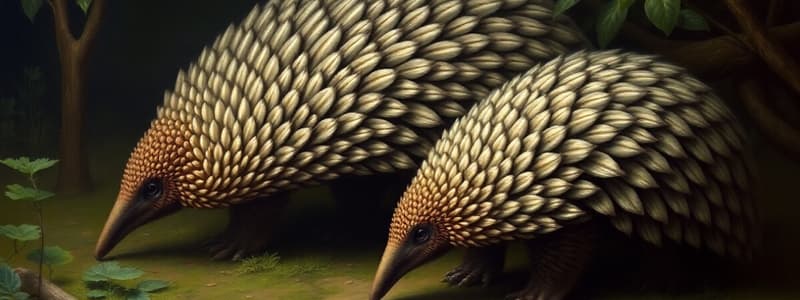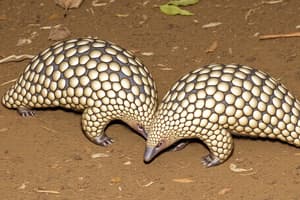Podcast
Questions and Answers
In which type of habitat are pangolins LEAST likely to be found?
In which type of habitat are pangolins LEAST likely to be found?
- Arid Savannahs
- Bamboo forests
- Deserts (correct)
- Mangroves
How do pangolins protect themselves from predators?
How do pangolins protect themselves from predators?
- By using their sharp teeth to bite
- By rolling into a tight ball, using their scales as armor (correct)
- By spraying a foul-smelling liquid
- By camouflaging into their surroundings
What is a key characteristic of a pangolin's diet that sets them apart from many other mammals?
What is a key characteristic of a pangolin's diet that sets them apart from many other mammals?
- They hunt small rodents and reptiles.
- They have a varied diet of both plants and animals.
- They filter feed on aquatic organisms.
- They primarily consume insects like ants and termites. (correct)
What is a unique feature of pangolin scales?
What is a unique feature of pangolin scales?
Which adaptation assists pangolins in consuming their prey?
Which adaptation assists pangolins in consuming their prey?
How does early life typically begin for pangolins?
How does early life typically begin for pangolins?
What is a key difference in physical size between male and female pangolins?
What is a key difference in physical size between male and female pangolins?
Which of the following poses a significant threat to pangolin populations?
Which of the following poses a significant threat to pangolin populations?
What is the purpose of stones that a pangolin swallows?
What is the purpose of stones that a pangolin swallows?
If a pangolin is described as a 'Temminck's Ground pangolin', what continent is it most likely to inhabit?
If a pangolin is described as a 'Temminck's Ground pangolin', what continent is it most likely to inhabit?
Besides scales, what covers the pangolin's body?
Besides scales, what covers the pangolin's body?
Why do pangolins file down their scales?
Why do pangolins file down their scales?
What do baby pangolins do while their mothers look for ants?
What do baby pangolins do while their mothers look for ants?
Which of these is NOT a predator of the pangolin species.
Which of these is NOT a predator of the pangolin species.
Which of these is NOT something that pangolins would consume?
Which of these is NOT something that pangolins would consume?
Flashcards
Pangolin Habitat
Pangolin Habitat
Found in primary and secondary forests, grasslands, bamboo forests, arid savannahs, scrublands, mangroves, riverine forests, villages, palm oil & rubber plantations and agricultural fields.
Pangolin Behavior
Pangolin Behavior
Nocturnal animals that dig burrows for sleeping and mating.
Pangolin Scales
Pangolin Scales
20% of their body weight is from their scales. Scales grow continuously just like human nails.
Pangolin Scales Maintenance
Pangolin Scales Maintenance
Signup and view all the flashcards
Pangolin Size
Pangolin Size
Signup and view all the flashcards
Pangolin Feeding Adaptation
Pangolin Feeding Adaptation
Signup and view all the flashcards
Pangolin Gender Size
Pangolin Gender Size
Signup and view all the flashcards
Pangolin Newborns
Pangolin Newborns
Signup and view all the flashcards
Pangolin Young Diet
Pangolin Young Diet
Signup and view all the flashcards
Pangolin Predators
Pangolin Predators
Signup and view all the flashcards
Pangolin Defenses
Pangolin Defenses
Signup and view all the flashcards
Pangolin Diet
Pangolin Diet
Signup and view all the flashcards
Pangolin Digestion
Pangolin Digestion
Signup and view all the flashcards
African Pangolins
African Pangolins
Signup and view all the flashcards
Asian Pangolins
Asian Pangolins
Signup and view all the flashcards
Study Notes
- The presentation is about Pangolins, research methods spring 2025
Topics of Discussion
- Place of Origin
- Habitat
- Body & Build
- Predators
- Prey
- Types of Species
- Diet
- Early life
Place of Origin
- Four species reside in Africa
- The four species in Africa are Black-bellied pangolin, White-bellied pangolin, Giant Ground pangolin, and Temminck's Ground pangolin
- Four species reside in Asia
- The four species in Asia are Indian pangolin, Philippine pangolin, Sunda pangolin and Chinese pangolin
Habitat
- Pangolins can be found in primary & secondary forests, grasslands, and bamboo forests
- They also live in arid savannahs, scrublands, mangroves, and riverine forests
- Pangolins can also be found in villages, palm oil & rubber plantations, and agricultural fields
- They are nocturnal and dig burrows for sleeping and mating
Body and Build
- Scales account for 20% of a pangolin's body weight
- The stomach is the only place not covered in scales, but hair
- Scales grow continuously, similar to human nails
- Scales are filed down due to burrowing and tunneling underground
- Tails can sometimes be white
- Weight ranges from 3.7 to 5.3 pounds
- Length ranges from 12 to 34 inches
- Tail length ranges from 11 to 34 inches
- Pangolins have no teeth
- They have a long tongue that can extend up to 10 inches
- Males are 10-15% heavier than females
Early Life
- The scales are soft and pale
- Scales harden on the second day of life
- Newborns weigh about 12 ounces at birth
- Babies nurse for 3-4 months
- They start eating termites and ants at 1 month
- The young will ride on their mothers tails while she burrows for ants
Predators
- Humans are predators through hunting and poaching
- Other predators include Leopards, Hyenas, and Pythons
- Pangolins protect themselves by rolling into a tight ball, using scales as armor
- When a mother feels threatened, she rolls around her young to protect them
- Pangolins spray a nasty smelling liquid, like a skunk
Prey
- Pangolins eat Ants, Termites, and Bee larvae
- They also eat Worms, Flies, and Crickets
- They have no teeth
- Their stomach is lined with spines to help mash food
- Pangolins swallow stones purposefully to help spines
- The tongue is used to reach into long holes to get food
Types of Species
- Four species reside in Africa, including the Black-bellied pangolin, White-bellied pangolin, Giant Ground pangolin and Temminck's Ground pangolin
- Four species reside in Asia, including the Indian pangolin, Philippine pangolin, Sunda pangolin and Chinese pangolin
Studying That Suits You
Use AI to generate personalized quizzes and flashcards to suit your learning preferences.


